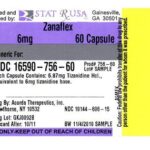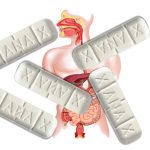How Long Does Tizanidine Stay In Your System?

Tizanidine (Zanaflex) is a medication that belongs to a class of drugs called skeletal muscle relaxants. Tizanidine is used to relieve the spasms and increased muscle tone caused by multiple sclerosis (MS, a disease in which the nerves do not function properly and patients may experience weakness, numbness, loss of muscle coordination, and problems with vision, speech, and bladder control), stroke, or brain or spinal injury.
Effectiveness appears similar to baclofen or diazepam. It is taken by mouth and works by blocking nerve impulses (pain sensations) that are sent to your brain. Tell your doctor right away if you have any serious side effects, such as fainting, mental/mood changes (such as hallucinations), slow/irregular heartbeat, vision changes (such as blurred vision). Tizanidine has rarely caused very serious (rarely fatal) liver disease.
How Tizanidine (Zanaflex) works
Tizanidine belongs to a class of drugs called alpha-2-adrenergic agonists. A class of drugs is a group of medications that work in a similar way. These drugs are often used to treat similar conditions. Tizanidine reduces the activity of nerves in the spinal cord that control muscles. This helps to reduce muscle spasms.
The action of this central alpha-2-adrenergic agonist causes pain sensations to be blocked. These are essentially nerve impulses that the body sends to the brain. Once the brain receives the nerve impulse, it signals the presence of pain sensations. By blocking these sensations, the person would gain temporary relief from the pain that they experience. This is a short-acting muscle relaxant drug. This means its effects can only be experienced for a relatively short period of time once the drug has been administered.
How long does it take for tizanidine (Zanaflex) to kick in?
When taken on an empty stomach, you should feel the effects of tizanidine (Zanaflex) within one hour of taking the medication. If you take the tablets with food, you might feel the effects within 30 minutes. If you take the capsules with food, you might not feel the effects for 2 to 3 hours.
How many tizanidine (Zanaflex) tablets can I take at once?
Since tizanidine (Zanaflex) comes in a few different strengths, this answer can vary depending on which strength you’ve been prescribed. Always follow the directions on your prescription label carefully, and let your provider know if it’s not working well enough. You should never take more tizanidine (Zanaflex) than what’s been prescribed without being told to do so by your provider.
How long does tizanidine (Zanaflex) stay in your system?
Tizanidine reaches a peak plasma concentration (tmax) at 1.5 hours and has a very short “half-life” of 150 minutes, the half-life of a drug is the time it takes for the amount of a drug’s active substance in your body to reduce by half. This depends on how the body processes and gets rid of the drug. It can vary from a few hours to a few days, or sometimes weeks.
For example, if you take 4mg tizanidine after 2.5 hours only about 2mg of the drug will remain in your system, tizanidine metabolites have a half-life of 20 to 40 hours and are not known to be active so most of the drugs will be eliminated from your system in about 24 hours after your last use but traces will remain detectable during drug test for the following period:
- Saliva for between 24 to 48 hours
- Blood for about 10 days
- Urine for between 5 to 13 days
- Hair for between 2 to 3 days
Note: Tizanidine does not come up in a drug test because most drugs screens do not test for the drug.
What are the risks and warnings for tizanidine (Zanaflex)?
Tizanidine (Zanaflex) can cause some serious health issues. This risk may be even higher for certain groups. If this worries you, talk to your doctor or pharmacist about other options.
Low blood pressure
Risk factors: Age 65 years or older | Taking blood pressure medications | Taking fluvoxamine or ciprofloxacin | Standing up from lying down quickly
Tizanidine (Zanaflex) works in the same area of the body as some blood pressure medications and can cause low blood pressure. The drop in blood pressure can be worse for people over 65 and those taking blood pressure medications. You shouldn’t take tizanidine (Zanaflex) if you take either fluvoxamine or ciprofloxacin. These two medications can cause these side effects to be dangerous. Low blood pressure from tizanidine (Zanaflex) can also happen if you stand up too fast, especially if you’ve been lying down. To prevent falls, try to stand up slowly and use a sturdy object to help yourself up.
Liver Damage
Risk factors: History of liver problems
Tizanidine (Zanaflex) can damage the liver. Because of this, if you have liver problems, you shouldn’t take this medication. If you are going to be taking tizanidine (Zanaflex) for a while, your provider might have you get blood tests done regularly to check your liver health.
Effect on driving and concentration
Risk factors: Taking with alcohol or illicit drugs | Taking other medications that cause drowsiness | People over 65
Taking tizanidine (Zanaflex) can make you feel sleepy and affect your concentration and focus. This is more likely to happen if you are over 65 or take other medications that cause drowsiness. Do not drink alcohol while taking this medication. Avoid activities that require you to be alert, like driving or operating machinery, until you know how the medication affects you.
Hallucinations
A very small number of people have experienced hallucinations after starting tizanidine (Zanaflex). Most of them knew the hallucinations were not real when they happened and found they went away once they stopped taking the medication. Talk to your healthcare provider if this happens to you. There might be alternative muscle relaxers that are better options for you.
Multiple Drug Interactions
Tizanidine (Zanaflex) is known to interact with several medications, including some over-the-counter products. Some of these interactions can be dangerous. Make sure to tell both your healthcare provider and your pharmacist about all medications and over-the-counter products you are taking before you start tizanidine (Zanaflex), even if you only take them once in a while or as needed.
Severe allergic reactions to tizanidine (Zanaflex) are possible, including life-threatening problems like anaphylaxis (closing of the throat). Call 911 if this happens. If you notice hives, a rash, swelling of the lips or tongue, or difficulty breathing after using tizanidine (Zanaflex), call your healthcare provider right away.
Kidney problems
Risk factors: History of kidney problems
People who have kidney problems should be careful using tizanidine (Zanaflex). Tizanidine (Zanaflex) is processed by the kidneys, and if they are not working properly, you could have a build-up of tizanidine (Zanaflex) in your body. This build-up can raise your risk of side effects like drowsiness and dizziness or make them more intense. If you have kidney problems, you will most likely be given lower doses of tizanidine (Zanaflex) to prevent these issues.
Withdrawal symptoms
Risk factors: Taking tizanidine (Zanaflex) for more than 9 weeks | Taking high doses of tizanidine (Zanaflex) | Also taking narcotic pain medications | Stopping tizanidine (Zanaflex) suddenly
If you stop taking tizanidine (Zanaflex) suddenly, you might experience withdrawal symptoms, including high blood pressure, a fast heartbeat, and muscle stiffness. This is more common if you’ve been taking a total of 20 mg to 28 mg per day for more than 9 weeks and then suddenly stop. It’s also more likely to happen if you are taking both tizanidine (Zanaflex) and narcotic medications, such as oxycodone or morphine. Talk to your healthcare provider if you would like to stop taking tizanidine (Zanaflex). They can help you lower your dose safely.
How long do tizanidine side effects last?
How long tizanidine side effects last depends on several factors. In general, most of the effects and side effects of tizanidine (Zanaflex) should begin to wear off six to eight hours after the last dose. Muscle relaxers like tizanidine (Zanaflex) cause a sedative effect and the most common side effect is drowsiness.





